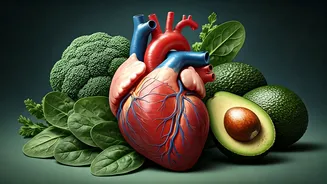Understanding Cholesterol Basics
Cholesterol, a waxy, fat-like substance, is vital for building healthy cells. However, high levels of LDL (bad) cholesterol can increase the risk of heart
disease. Dietary choices significantly impact cholesterol levels, making it crucial to understand the role of food in maintaining cardiovascular health. By incorporating cholesterol-lowering foods into your diet, you can naturally reduce LDL cholesterol and improve overall heart health. Regular monitoring and lifestyle adjustments are essential for effective cholesterol management.
Oats and Fiber's Power
Oats, especially those in the form of oatmeal and oat bran, are excellent choices for lowering cholesterol. They contain soluble fiber, which binds to cholesterol in the digestive system, preventing its absorption. Studies show that consuming as little as 1.5 cups of cooked oatmeal daily can reduce LDL cholesterol by 5-8%. This simple change in your breakfast routine can lead to significant improvements in cholesterol levels. Adding fruits like berries or a handful of nuts to your oatmeal can boost its effectiveness.
Embracing Fatty Fish
Fatty fish, such as salmon, mackerel, and sardines, are rich in omega-3 fatty acids, known to lower LDL cholesterol and reduce triglycerides, which are another type of fat in the blood. Omega-3s also help improve overall heart health by reducing inflammation and preventing blood clots. Aim to include fatty fish in your diet at least twice a week. Methods of preparation include grilling, baking, or steaming. These cooking methods retain the nutrients while avoiding added unhealthy fats.
Nuts for Heart Health
Nuts, especially almonds, walnuts, and cashews, can help improve cholesterol levels. They are packed with healthy fats, fiber, and other nutrients that contribute to heart health. Research indicates that consuming a handful of nuts daily can lower LDL cholesterol by up to 5%. Nuts also offer various benefits, including antioxidant properties. Opt for unsalted nuts to avoid excess sodium intake. Make nuts a part of your daily snack rotation by adding them to salads or enjoying them as a quick energy boost.
The Power of Legumes
Legumes, including beans, lentils, and peas, are excellent sources of soluble fiber, which can reduce cholesterol absorption. These also contribute to lowering LDL cholesterol levels. A high-fiber diet is generally beneficial for managing cholesterol and improving overall heart health. Legumes provide a great source of plant-based protein, making them a nutritious addition to any diet. Incorporate legumes into your meals regularly, whether in soups, stews, or salads. It can offer additional health benefits.
Olive Oil's Benefits
Olive oil, a staple in the Mediterranean diet, contains monounsaturated fats that can help lower LDL cholesterol. It also provides antioxidants that protect against heart disease. Using olive oil instead of saturated fats, such as butter or coconut oil, can make a difference in your cholesterol levels. Adding olive oil to your diet is easy and delicious. Use it for cooking, salad dressings, or drizzling over vegetables. Ensure you're using extra virgin olive oil for the maximum health benefits.
Fruits and Vegetables
Fruits and vegetables play a significant role in lowering cholesterol. They are packed with fiber, vitamins, and minerals that support heart health. Certain fruits, such as apples, grapes, strawberries, and citrus fruits, are particularly beneficial due to their high pectin content, a type of soluble fiber. Aim to fill half your plate with fruits and vegetables at every meal. This will help you manage cholesterol and provide many essential nutrients. Ensure you consume a variety of colorful fruits and vegetables for optimal benefits.




















